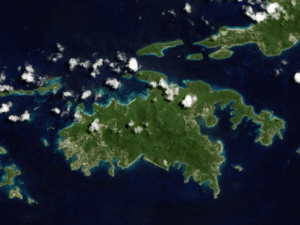
The idea of selling government-owned assets in the U.S. Virgin Islands is mooted periodically, though only in the case of utilities has that discussion been substantive. However, the idea has been repeated more frequently in the period leading up to the 2018 general election. The Virgin Islands Daily News, in its editorial on Saturday, December 1, 2018, identified a list of priorities for action by the incoming administration. Included in that list is the recommendation to “sell all excess government properties.” As The Virgin Islands Daily News has stated its intent to continue highlighting these recommendations, it may be useful to remind ourselves about what exactly is government property, and for what purposes should such property be used.
A useful starting point for a discussion is the perception that there is “excess” government property to be sold. All government assets are acquired or established for provision of a specific public benefit. At least that is supposed to be the case. While not all acquisitions have produced the outcomes intended, that does not change the underlying premise. This concept also holds (mostly) for assets gifted to the government. So, if these assets were deemed to be useful on acquisition, at what point did they become “excess”? Who determines what is excess, and why should the government not own assets for future uses?
The second issue is that the idea of selling government properties is framed as a means of addressing short-term cash flow problems. Government properties are publicly-owned assets, and sale of public assets should only take place after thorough review of all the potential uses of the asset(s) for producing public benefits. Clearly an in-depth review should be a participatory process, and one that considers both current and future needs.
What is most disturbing to me about this call to sell public property is the casual carelessness of the suggestion. Consider the following:
• The Government of the U.S. Virgin Islands was renting private property prior to the hurricanes in 2017, and with substantial damage to both public and privately-owned buildings, is in serious need of additional space.
• A large number of social infrastructure (such as schools, roads, landfills, sewage plants and lines, and power plants) need to be relocated, either because they have exceeded their lifespan, are currently vulnerable to natural disasters, or will soon be in the wrong place because of sea level rise.
• Intense rain events have demonstrated the inadequacy of the current stormwater management systems. Storm drains need to be expanded and comprehensive drainage systems need to be constructed.
• The climate change forecasts for the U.S. Virgin Islands indicate that large portions of our main urban centers will be inundated by sea level rise.
From whence will the properties come to meet the aforementioned needs? Given the current and future demand for buildings and land, there is clearly no such thing as “excess” government property in the U.S. Virgin Islands at this time. As such, any sale of public assets should be only in situations where the sale is essential to achieve strategic development goals. However, in order for the community to determine what constitutes strategic development goals, it is necessary for the community to have a serious discussion regarding the needs and future development options for the Territory. How about making that the priority action.
Editor’s note: Lloyd Gardner is a consultant in Environmental Planning at Parks Caribbean Initiative, Environmental Policy and Planning Consulting Services, Foundation for Development Planning Inc.






This article is confounding. How many of these gov’t-owned properties are being maintained to a reasonable and attractive standard? How many are visibly derelict, blighting our views and communities (former Michelle Motel)? The VI gov’t has been a poor example of stewardship and responsibility with its properties (Gov’t House and Gov mansion STT). So many examples of VI gov’t neglect, mismanagement, waste. Why HAVE they NOT maintained and preserved and used (except for storing moldy files and homeless people) the properties they own? This bears investigation.
I understand the concern regarding public sector agencies not adequately maintaining buildings, and I agree that the issue should be addressed. However, the article suggests that we look beyond the disrepair of buildings and consider the following:
(1) Properties include land, movable assets (such as artifacts), intangible assets (such as cultural spaces and scenic vistas), enterprises, easements, and other forms of assets.
(2) There is significant need for more publicly-owned properties, primarily for relocation on public infrastructure. That means more land. Though the government can rent office space, placement of sewerage, landfills, roads, schools, storm drains, and other infrastructure suggests public ownership in the situation where a small population and market constrain private investment in the provision of public services.
(3) Publicly-owned assets can be leveraged in many ways to provide public benefits. Are assets not “properly”maintained to be sold and the proceeds placed in the general fund? Should the proceeds be used for a specific strategic purpose? Should there be asset swaps?
Bottom line, understand all the needs for public properties, assess the potential uses of publicly-owned assets, and make decisions regarding publicly-owned assets (including buildings) in the context of strategic development imperatives for the Territory.